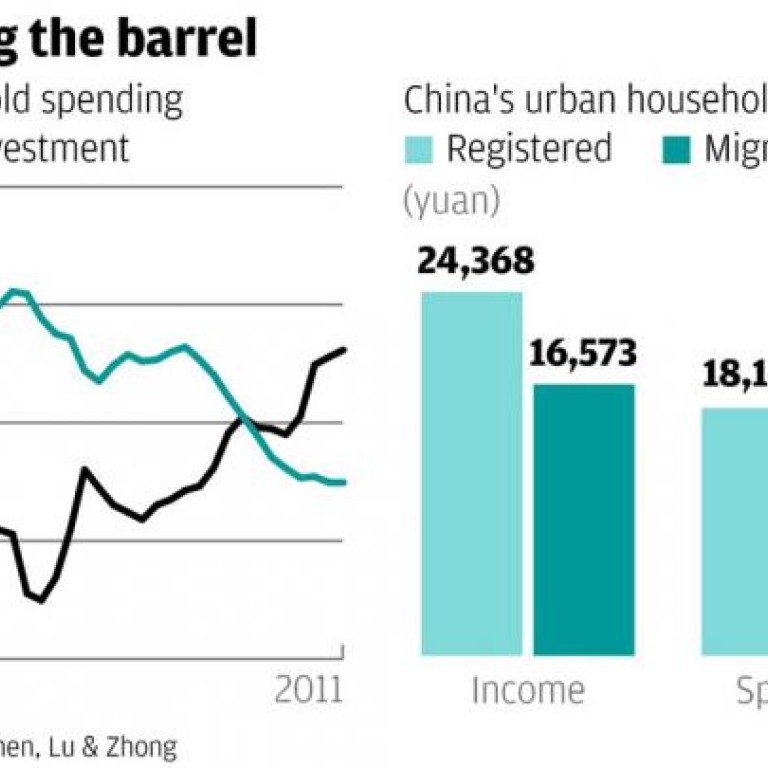
Limits on China's migrant workers barrier to plan to lift their spending
Apparently Beijing is now relying on a vast army of migrant labourers to boost consumer spending and rebalance China's economy.
According to a report published yesterday by the National Population and Family Planning Commission, the mainland's 230 million migrant workers "would greatly stimulate China's consumption growth" if only they spent more money.
At first this sounds like the noise of a barrel being desperately scraped.
Last year household consumption accounted for just 35 per cent of gross domestic product - a record low. Meanwhile, fixed investment made up 46 per cent of GDP (see the first chart), a record high and a level most analysts believe to be unsustainable.
Now with the mainland's economic prospects weakening and private-sector investment slowing, policymakers are keener than ever to encourage consumer demand as an engine of future growth.
But if you are going to pin your hopes on one group of consumers to spur domestic demand, migrant workers hardly look the most promising - at least at first.
Migrant workers are poor. It's true that they improve their lot by leaving the countryside as the typical migrant earns double the average rural income.
But that doesn't leave them rolling in spare cash. According to one recent University of Hong Kong study, the average income last year for migrant households was just 16,600 yuan (HK$19,550), a third less than for permanent city-dwellers, who pocketed 24,400 yuan.
But migrants don't just earn less. They also spend less of what they earn.
The reason for their thriftiness is the iniquitous household registration system.
Because they are not officially classed as city-dwellers, rural migrants are not only limited in the jobs they can get but also in the pay they can earn.
Typically they are also refused access to public housing, their children may be turned down by local schools and they are often denied pension and health care benefits.
As a result, they tend to save a higher proportion of their incomes as a precaution against future education and health costs. The same HKU study reckons migrants typically save 30 per cent of their income, while non-migrant urban households save just 25 per cent of theirs (see the second chart).
This means the system ensures that 30 per cent of the mainland's urban population are underpaid, deprived of social benefits and constrained in their ability to consume.
The effects are appreciable. If migrants had earned as much as regular city-dwellers last year, and spent as much of their income, consumer spending would have been greater by some 562 billion yuan.
That would have been enough to boost consumer spending by 3.5 per cent and add 1.2 percentage points to China's overall rate of economic growth.
Clearly then, the National Population and Family Planning Commission is right. Migrant workers really would boost consumption and economic growth if only they spent as freely as their urban neighbours.
But inducing them to spend would mean scrapping the system and affording migrants the same employment opportunities as city-dwellers and equal access to social welfare services.
Unfortunately, the system has plenty of influential supporters among employers.
According to one estimate, if urban employers were obliged to make welfare contributions on behalf of their migrant workers, payroll costs would rise by as much as 40 per cent overnight.
Right now, that would have a crippling effect on corporate profits. So although getting rid of the system might well boost consumption, don't rely on it happening any time soon.

